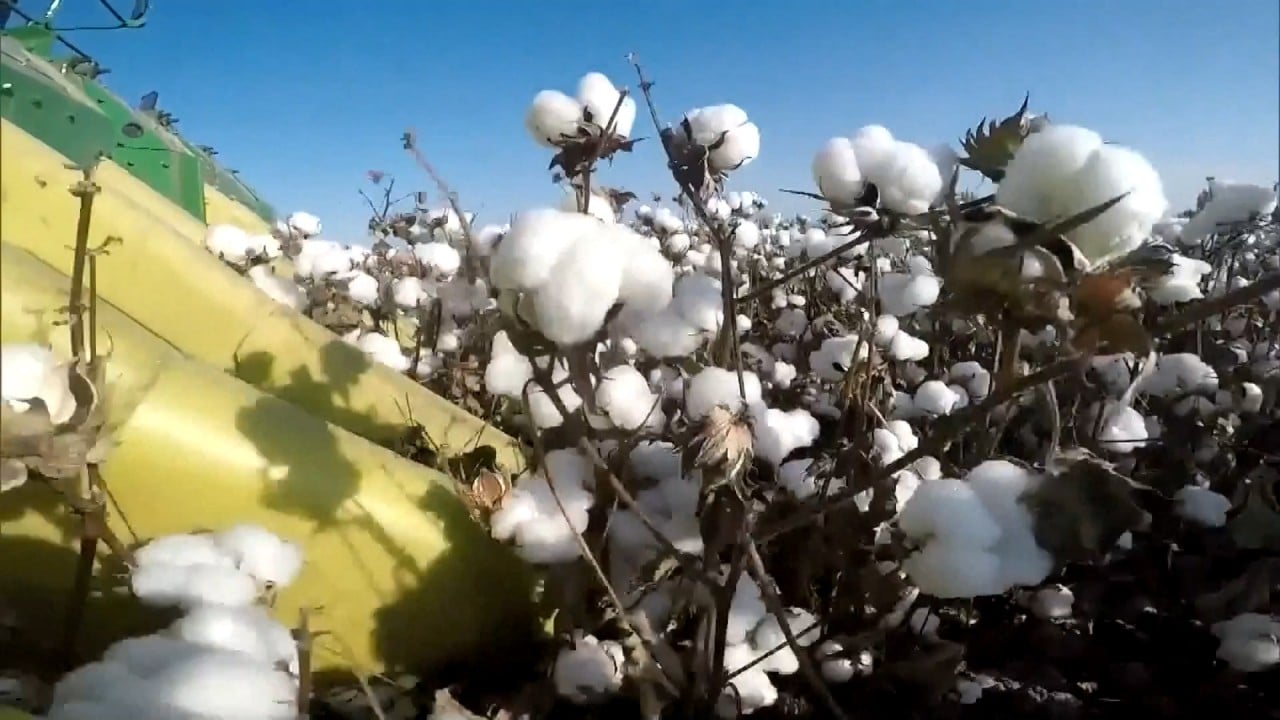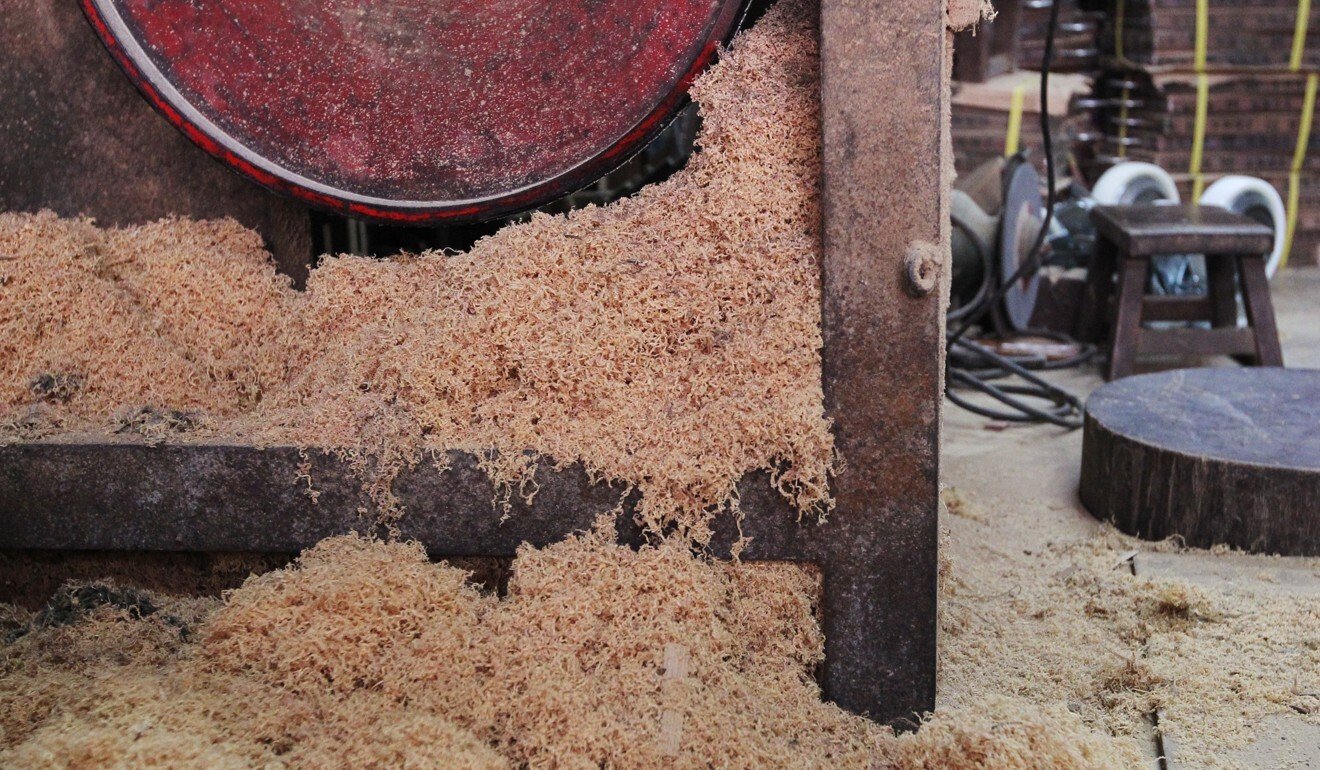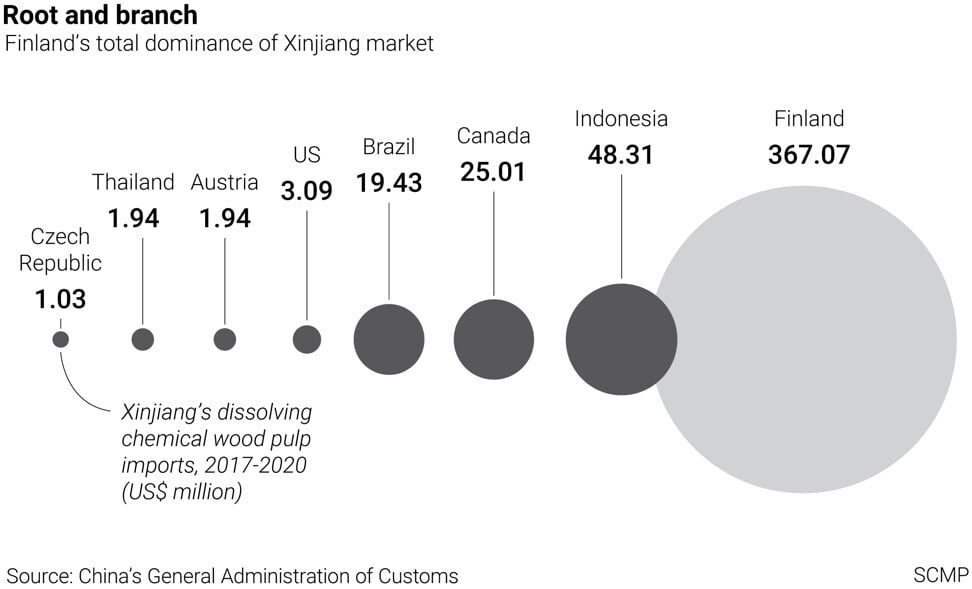
Day after Xinjiang link disclosed, Finnish wood pulp giant Stora Enso says it will leave viscose market
- Executive announces the policy change in response to Finnish news media’s questions about SCMP’s article on exports to Xinjiang
- Industry analyst says the decision is a ‘massive surprise’
In a statement published on Stora Enso’s website on Monday, chief financial officer Sepp Parvi said the company was “moving away from the global soluble pulp segment for viscose production”.
“This segment is not the core of our operations and represents only a very small part of our entire business. Soluble pulp is produced at the company’s Uimaharju pulp mill, which produces both soluble pulp and ordinary pulp,” Parvi said.
He initially announced the policy change in response to questions from Finnish media outlets about the Post’s story on the rise of Xinjiang’s viscose sector.

01:08
Xinjiang, China’s top cotton producer
Industry experts were taken aback by the announcement. “It’s a massive surprise to everyone,” said one analyst who did not want to be named.
The Post report showed that Xinjiang has emerged as a major player in the global viscose industry – and that Finland is by far Xinjiang’s biggest foreign supplier of dissolved chemical wood pulp, the raw material needed to make the textile fibre.
China is accused of putting 1 million Uygurs and other Muslim ethnic minority groups in detention camps throughout the far-west Xinjiang Uygur autonomous region and subjecting many of them to forced labour. And Chinese records show how the viscose supply chain in Xinjiang is intrinsically linked to entities already sanctioned by the United States for alleged ties to forced labour.
Beijing has described the international backlash against the suspected human rights abuses as “a strategic conspiracy with an attempt to disrupt China”, and has demanded concrete evidence that the camps are used for forced labour.
Supply chain experts say it has become impossible to conduct an effective audit of labour conditions in Xinjiang because Uygur workers are unable to speak candidly with any outside monitor.
Stora Enso previously confirmed that it exports its dissolved chemical wood pulp to entities in Xinjiang.
“We have a relationship with the [Xinjiang-based] customer since 2012 and have over the years regularly visited the company production sites. During those visits we have never seen signs of forced labour,” said a spokesman in a written statement.
When asked how much pulp it sells to Xinjiang, the firm said it did “not disclose sales figures for individual mills or customers”.
Parvi did not mention links with China or Xinjiang in his statement on Monday, instead saying that a “strategic direction is still in line with what we announced at Capital Markets Day in November 2020”.
“The divestment of our soluble pulp business will not have a material impact on our financial results. We have a quiet season right now,” he added.
In a transcript of the Capital Markets Day event, the Helsinki-based firm’s chief executive, Annica Bresky, said that “market pulp will not be an area for growth for us”. Instead the company said it would use its pulp mills “as the platform for developing new biomaterials”.
But Chinese customs records show that Finland has continued to be Xinjiang’s biggest foreign supplier of dissolved wood pulp into 2021. Over the first two months of this year, Finland’s shipments to the region shot up 72.72 per cent from a year earlier, according to Chinese customs data.
However, January and February 2020s trade figures were crippled by the early stages of the pandemic in China. Total imports in the first two months of 2021, worth US$17.6 million, were down from a record US$23.92 million over the corresponding period in 2019.
Still, Finland is one of only two nations to have directly shipped the product to Xinjiang this year, records show. The other is Chile, which shipped US$7.76 million in the first two months of the year.
Stora Enso did not respond to further questions from the Post about when it would divest. But it previously confirmed a long-standing relationship with the state-owned Chinese viscose manufacturer Zhongtai Chemical, which also has links to the Xinjiang Production Construction Corps (XPCC), a quasi-military outfit that has been sanctioned by the United States for suspected human rights abuses.
In 2018, a representative from Stora Enso met with Zhongtai Chemical officials in Xinjiang. At the meeting, a senior official at the Chinese company said they were “long-time partners” with Stora Enso, adding that he hoped they could “deeply explore the potential of cooperation”, according to a Zhongtai Chemical press release.
Heidi Hautala, a former minister in the Finnish government and current vice-president and member in the European Parliament, said the situation showed that “companies need to do their human rights due diligence with utmost duty of care, both downstream and upstream”.
“This is especially pertinent at the moment when the EU is moving towards mandatory human rights and environment due diligence legislation,” she added, referring to planned actions that would effectively ban products made using forced labour from the EU market.

Pulp and paper are huge parts of the Finnish economy – naturally, given that 75 per cent of the country is covered with forest.
“In Finland‘s history, we have used wood and pulp material for a long, long time. Today, many of these companies have changed their strategies towards global markets because the world is changing and now there are mega trends they need to react to in the market,” said Maarit Lindström, chief economist at the Finnish Forest Industries Federation.
Yet Finland‘s leading companies are now global players. According to its corporate literature, Stora Enso leases 76,000 hectares (188,000 acres) of forest in the Chinese province of Guangxi.
In its 2020 annual report, the firm said it had been “granted various investment subsidies” and “given certain investment commitments” in China, as well as Finland and Sweden.
“If committed planning conditions are not met, local officials may pursue administrative measures to reclaim some of the formerly granted investment subsidies or to impose penalties on Stora Enso, and the outcome of such a process could result in a negative financial impact,” the report read.
Stora Enso previously told the Post it was “deeply concerned by reports of forced labour and discrimination of minorities in the region of Xinjiang”.
“We are doing our best to assess the situation through relevant stakeholder contacts. Stora Enso is fully committed to international principles and standards for human rights and does not accept any violations against those,” said a company spokesman.



